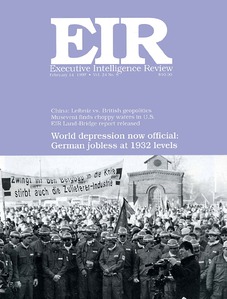Interviews
Vladimir A. Kozlov
Mr. Kozlov, a member of Russia’s upper house of parliament, the Federation Council, is from Russia’s Jewish Autonomous Republic, near the Russian-Chinese border, and along the route of the Eurasian land-bridge.
Michael B. Duke
A leading advocate for human activity on the Moon discusses the implications of the discovery of water ice on the Moon’s surface.
Ben Swan
The Massachusetts state representative was part of the Schiller Institute fact-finding mission to Sudan in September 1996.
Bobby Odom
The Louisiana state agriculture commissioner explains why he is calling for emergency measures to protect America’s milk supply.
Departments
Report from Bonn
by Rainer Apel
Too fast for slow German bureaucrats?
Australia Dossier
by Robert Barwick and Allen Douglas
High Court pushes “land rights.”
Editorial
Trent Lott’s suicide pact.
Economics
New jobless figures tell Germans: Depression is here
by Rainer Apel
The January figures released by Germany’s Federal Unemployment Office, are the worst since January 1933. The Second Great Depression has arrived.
Currency Rates
Sweeney tells Davos Forum to reject post-industrial ‘U.S. model’
by Marianna Wertz
The AFL-CIO president warned other nations not to follow the U.S. embrace of “neo-liberal” policies, that have wrecked the United States and are being forced on poor nations by the IMF.
Russian government to revive Baikal-Amur Siberian railroad
by Rachel Douglas
Spurred by the Eurasian Land-Bridge, Russia may revive the Baikal-Amur Mainline and the century-old Trans-Siberian Railroad.
The Land-Bridge can unite Russia’s regions
An interview with Vladimir A. Kozlov.
Budget cuts, not mother nature, caused Florida crop damage
by Richard Freeman
The Sunshine State lost more than $270 million to frost damage, when the penny-wise and pound-foolish pundits of fiscal responsibility cut $3 million from the National Weather Service agricultural forecast division.
Cardoso wants to hand over Brazil’s mining resources to the British Empire
by Silvia Palacios and Lorenzo Carrasco
Venezuelan doctors lead anti-IMF fight
by David Ramonet
Lunar ice will enhance development of the Moon
An interview with Michael B. Duke.
Business Briefs
Feature
Leibniz’s vision for China versus British geopolitics
by Helga Zepp-LaRouche
In her speech to the ICLC-Schiller Institute conference in Kiedrich, Germany, last December, Helga Zepp-LaRouche reports that the biggest threat to Britain’s desperate efforts to hang onto its empire in the face of a rapidly collapsing world economy, is the prospect of a community of principle among sovereign nation-states, to create a global economic miracle. This was the vision for a rapprochement between Europe and China, of Gottfried Leibniz, the Jesuit missionary Matteo Ricci and his followers, and China’s Dr. Sun Yat-sen. That vision is what lies behind the Euro-Asian Continental Bridge, now.
International
Uganda’s Museveni finds choppy waters in U.S.
by Linda de Hoyos
Museveni, the “blue-eyed darling of the British in East Africa,” has deployed his 100,000-man National Resistance Army in aggressive wars against Sudan and Zaire. But his reception in the United States was not a warm one.
SSIM blasts Garang as ‘bloody dictator’
The text of a Jan. 25 statement by the South Sudan Independence Movement.
50,000 Belgians march against plant closings and for social justice
by Dean Andromidas
Steel workers facing layoff were joined by the families of the victims of Belgium’s notorious pedophile murder ring.
Albanians say ‘No’ to IMF’s ‘model pupil’
by Konstantin George
Seven out often families suffered major losses in the collapses of this already-poor country’s free-market investment schemes.
Peru’s Fujimori garners support vs. terrorists
by Valerie Rush
After meeting Japan’s prime minister in Canada, the two pledged no concessions to the MRTA narcoterrorists.
German Social Dems help drug mafia
by Christina Huth
International Intelligence
National
Kennedy-Daschle agenda limps along, one year later
by Jeffrey Steinberg
Organizing by the LaRouche movement and the labor movement has increased public support for initiatives proposed over a year ago, to end what Sen. Edward Kennedy called the “Quiet Depression.”
EIR’s ‘Eurasian Land-Bridge’ report presented in Washington
by Nancy Spannaus
Eleven embassies, mostly representing Central and East Asia, heard Lyndon and Helga LaRouche present the case for the United States to put its support behind this global development project, detailed in EIR’s 290-page Special Report.
American Bar Association votes for moratorium on capital punishment
by Marianna Wertz
Emergency action needed to protect milk supply
An interview with Louisiana Commissioner of Agriculture Bobby Odom.
Is the NSA riddled with Tofflerism?
by Edward Spannaus
If the remarks of its new head are any measure, the answer is, yes.
Congressional Closeup
by Carl Osgood
National News



